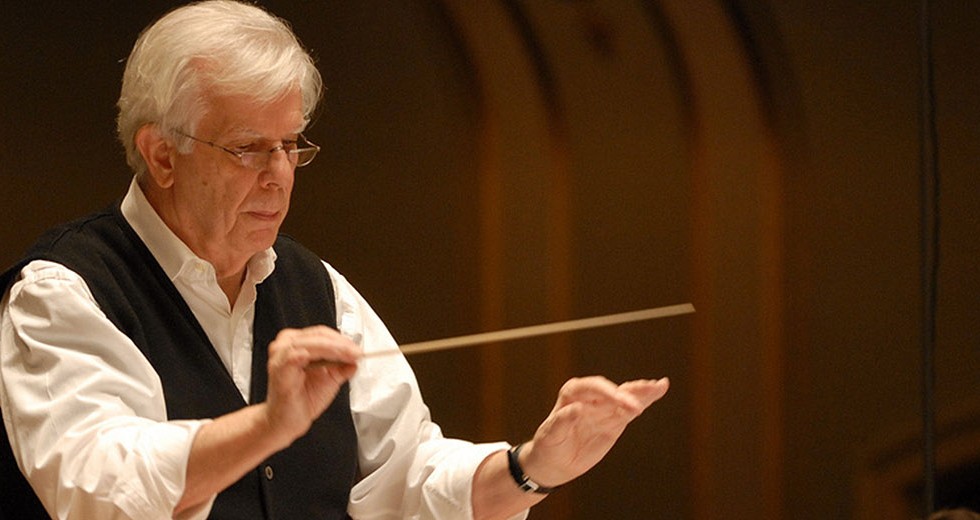
Most Midwesterners have seen quite enough snow this winter, thank you very much.
But in mid-April, conductor Christoph von Dohnányi, scheduled to lead the Chicago Symphony Orchestra in subscription concerts May 1-3, was reveling in the sight.
“I’m looking out my window,” said the German-born conductor, who, with his wife, Barbara, has a home just south of Sturgeon Bay in Door County, Wis., “and the snow is very pretty. We didn’t get much snow this winter in Europe, so I’m happy to have it here.”
Maestro Dohnányi, now 84, has long been a pre-eminent figure among the conductors who emerged in Europe shortly after World War II. Americans know him best as music director of the Cleveland Orchestra, a post he held with great distinction from 1982 (as music director-designate until 1984) through August 2002. Before that, he held the top musical posts at German opera houses, including Frankfurt and Hamburg (a city that he now regards as home), and with orchestras in Kassel and Cologne.
It was in Frankfurt that the young Dohnányi connected with Georg Solti, a rising star of that era, who would go on to become the CSO’s music director (1969-1991). Solti was music director of the Frankfurt Opera between 1952 and 1961, and in 1953, Dohnányi, then in his early 20s, signed on as Solti’s assistant.
“Solti was a wonderful boss,” Dohnányi said. “He was very supportive. Young conductors and composers, young musicians always had access to him. He was an extremely positive boss. I was composing then, and he heard some of my music and even commissioned a composition for a ballet.” After working with Solti, Dohnányi moved to Lübeck in 1957, becoming Germany’s then-youngest general music director.
As a teenager in Berlin, Dohnányi found his life was tragically shadowed by the Nazis, after the party came to power in 1933. His father and several other relatives, including an uncle, the noted theologian Dietrich Bonhoeffer, actively worked against the Nazis. They were arrested in 1943 when Dohnanyi was 13 and executed in spring 1945 a few weeks before the Nazis surrendered. (The New York Review of Books published an extensive article in 2012 on their fate, and the Boston Globe published a similar feature in October.) Dohnanyi briefly considered studying law, but soon switched to music, studying in Munich. He completed his degrees in Tallahassee, Fla., of all places, where he studied with his grandfather, pianist and composer Ernst Dohnanyi, who was on the faculty of Florida State University. (As a young pianist, Solti also studied with Ernst Dohnanyi.) The young Dohnányi wrapped up his studies in 1952 at the Tanglewood Festival with a summer conducting class.
It was relatively easy, he recalled, to drop composition and focus on conducting. He simply didn’t feel an all-consuming need to express his musical ideas on score paper. And the repertoire now available to symphony orchestras is vast, stretching across more than three centuries from Bach and Handel to John Luther Adams.
“I gave up composing pretty soon,” Dohnányi said. “In composing today there has to be a certain inner drive. A real composer cannot do anything else but compose. And now there’s so much more repertoire. In the 19th century that wasn’t so much the case After all, it was Mendelssohn who rediscovered Bach [with a famous 1829 performance of the St. Matthew Passion].”
But Dohnányi has always valued 20th century and contemporary music. During his years in Cleveland, he conducted the world premieres of works by composers including John Adams, David Lang, Elliott Carter, Christopher Rouse and Ellen Taaffe Zwilich. His upcoming CSO concerts open with Witold Lutoslawski’s Musique funèbre, a piece from 1958. Repertoire also includes Beethoven’s Piano Concerto No. 3 with pianist Paul Lewis and Tchaikovsky’s Symphony No. 6 (Pathétique), the composer’s final, mournful symphony.
“I am not so keen on choosing a program just because the pieces fit together,” Dohnányi said. “But by chance, the Lutoslawski and the Tchaikovsky fit very well.” Lutoslawski wrote Musique funèbre to honor both the 10th anniversary of Bela Bartók’s death and the failed Hungarian Revolution of 1956, a popular uprising crushed by Soviet troops. “Lutoslawski was a very fine man and a real anti-fascist,” he said. “This is a Polish composer saying, in a totally different way, what Tchaikovsky was saying. It’s a very human piece, about our greater humanity.”
These days, Dohnányi is enjoying the wide-ranging life of a much sought-after guest conductor. Along with his title of the Cleveland Orchestra’s music director laureate, he is honorary conductor for life of London’s Philharmonia Orchestra, an association that dates back to 1994. He appears regularly at Tanglewood and the Salzburg Festival and has had a long relationship with the Boston Symphony Orchestra. He made his CSO debut in 1974, and in recent years has been a regular, welcome guest conductor at CSO concerts in Symphony Center and the Ravinia Festival.
“It’s a totally different situation when you’re responsible [as music director] for an orchestra,” Dohnányi said. “When I’m a guest, I have so many friends in these cities. We have been together for so many years. I see old friends. I’m amazed how happy I am visiting these orchestras.”
Wynne Delacoma, former classical music critic of the Chicago Sun-Times, is a Chicago-based arts writer and lecturer.
VIDEO: Christoph von Dohnányi discusses his career, in an interview done for the Philharmonia Orchestra of London, via YouTube.